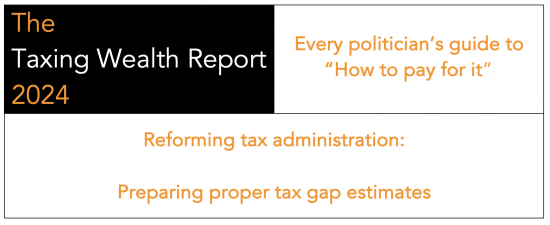I have this morning published the next note in the Taxing Wealth Report 2024 series. In it, I suggest that it is essential that the UK considerably enhance the quality of the tax gap reports that it currently produces annually.
Whilst the UK is to be applauded for undertaking this exercise, which is in itself rare internationally, the approach HM Revenue & Customs adopts to tax gap analysis is both too limited in scope and far too orientated towards making the management of HMRC appear to be fulfilling their objectives to be of real use in controlling the UK tax system.
As a result, considerable reform is required which would involve little cost but which might deliver considerable benefit, particularly when wishing to control the expansion of illicit wealth in the UK.

The summary of this report says:
Brief Summary
This note suggests that:
- The UK should prepare proper estimates of the tax gaps[1] within its tax system.
- Because the UK's HM Revenue & Customs does not prepare comprehensive tax gaps at present a wide variety of tax losses go unreported, including:
- The loss from tax bases, like wealth, that are not taxed;
- The cost of exemptions, allowances and reliefs within the tax system;
- The cost of the abuse of those exemptions, allowances and reliefs;
- The cost of tax avoidance because HM Revenue & Customs use a very narrow definition for the identification of this abuse.
- It is likely that the UK's tax gap is considerably larger than that reported by HM Revenue & Customs.
- If a broader five-tier gap analysis that included consideration of untaxed tax bases and the cost of tax exemptions, reliefs and allowances was to be undertaken annually:
- Debate on the UK's tax system would be considerably better informed;
- HMRC would manage its resources more effectively;
- Rates of tax abuse might be reduced;
- Rates of taxpayer compliance might rise;
- Taxpayer morale would increase over time.
- The cost of undertaking this exercise is small compared to the benefits that might be gained.
- Because there is no direct relationship between better estimation of the tax gap and enhanced tax yield no estimate of the benefit to be gained is made.
- Because many tax gaps are created by measures benefitting the wealthy and those with high incomes, this change might have particular impact on them.
This measure is intended to reduce the chance of illicit accumulation of wealth within the UK.
Discussion
As long-term readers of this blog will know, I have been discussing the UK tax gap and the reason why HM Revenue & Customs might significantly under-record it since at least 2010. So far, any changes HMRC has made seem to reduce the tax gap on every occasion. I think that to be an unlikely direction of travel especially when, for example, we know that there was substantial corruption during the Covid era and yet this did not have an impact on tax losses.
What we do know is that the UK might need more tax revenue to control the impact on inflation of the additional government spending that is now required to meet the demand for government services. If that is the case reforms to taxes might be required, as I have been proposing in this series. But, as importantly, the methods of tax collection might also need to change for reasons I outlined here. To do that, we need to better understand how the tax system works and then act on the basis of that enhanced understanding. Better tax gap appraisal is all about doing just that. However, HM Revenue & Customs do at present seem to treat it as a measure of its management's ability, and when they are in charge of both the tax system and tax gap measurement, that is inappropriate.
As a result, in this proposal I suggest that we need to use better tax gap methodologies. I also suggest that a third-party agency be tasked with preparing tax gap data. And finally, I suggest that tax gap analysis not just be about the quantum of tax lost, but also about understanding the causes for that loss, which is much more important.
What has this to do with taxing wealth? The answer to that is quite a lot. Those who do not pay the right amount of tax accumulate wealth faster than those who do pay their taxes. Every firm of tax justice requires that the tax system work as intended. The tax gap, if properly used, can help explain how to address this issue. That is why it is so important, and why change is required.
That said, no value is attributed to this change because estimating such gains is notoriously unpredictable. They will happen, but proving causation is hard and so no claim is made.
Cumulative value of recommendations made
The recommendations now made as part of the Taxing Wealth Report 2024 would, taking this latest proposal into account, raise total additional tax revenues of approximately £70.2 billion per annum. No value has been attributed to the proposal recommended here, for reasons noted above.
Footnotes
[1] Tax gaps are the differences between the tax revenues that a jurisdiction should be able to collect and the tax revenues it actually recovers during the course of a period.
Thanks for reading this post.
You can share this post on social media of your choice by clicking these icons:
You can subscribe to this blog's daily email here.
And if you would like to support this blog you can, here:



For me, the tax gap is simply a pool of money that finds its way into our political systems and perverts it in favour of the rich.